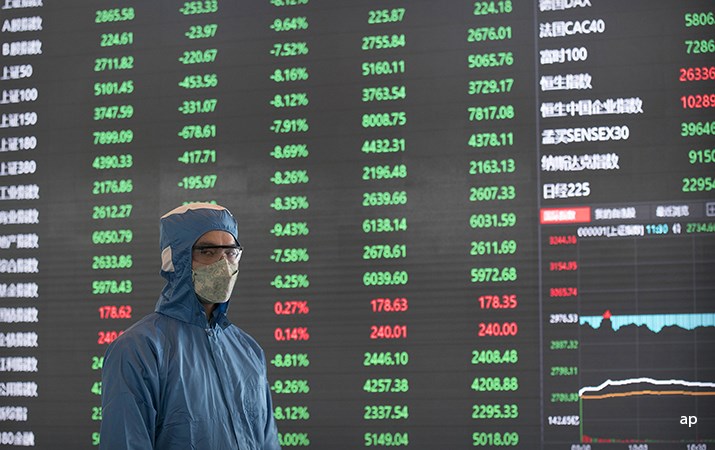
As the Coronavirus has made shockwaves across world, many global stock markets have gone into panic mode. Yet history tells us that past epidemics have made only a shallow impression on markets.
From the SARS outbreak in 2003 to the twin strikes of ebola in 2014 and 2016, and a bout of Zika in between, disease has made headlines and jostled markets. But each time, the outbreaks – and the financial losses – were eventually contained.
“Market participants tend to react to such unforeseen outbreaks,” says Morningstar Investment Management’s Carolyn Szaflik, “but markets tend to recover by the six-month mark. This suggests that sentiment drives early losses, but sustained economic impacts are less perhaps investors fears at the onset.”
Before we look at some impact and opportunities created by the coronavirus, a word on how markets have reacted to previous outbreaks.
How Markets React to Epidemics
Since 1998 there have been nine global epidemics but little evidence linking them to long-term fundamentals, says Szaflik. For investors, that means avoiding the hysteria and focusing on the factors that make businesses worth investing in.
A key consideration for the moment is the potential effect of coronavirus on cash flows. And there’s already enough to think there will be fallout, notes Szaflik. Empty streets in China, fewer flights, fewer customers, less turnover, and crucially, a hit to global supply chains and a drop in output for the world’s largest economy. The damage will emerge in future earnings reports.
Exhibit 2: Market Reaction to Global Epidemics
That said, it’s not necessarily a trigger to dump stocks, crystallise losses and seek refuge in cash, says Szaflik. Share prices may have dropped but China is on the case. Its stimulus measures have curbed the losses and the country’s central bank is set to lower the lending rate and relax rules around how much money banks have to keep in reserve.
So what to do? Watch and wait, says Szaflik: “We certainly won’t be hitting the panic button and we hope investors won’t either.” Let’s examine the extent to which sectors and companies linked to China will be affected.
Smartphone Supply Chains
The latest sell-off creates a good opportunity to pick up shares of Hon Hai Precision (HHPG) and Largan Precision (3008), whose shares are trading at respective discounts to their fair values, according to Morningstar analyst Don Yew.
He argues the potential disruption to the smartphone supply chain is limited because the bulk of coverage companies’ production sites are outside of the virus epicentre. Companies such as Apple, meanwhile, have two or three suppliers in their chain for each product component, giving them alternative options if one supplier is hit.
Opportunities in Autos
Carmakers could see a modest boost as people will shun public transport in favour of private means of getting about, says Morningstar equity analyst Ivan Su. However this won’t be a long-term trend and empty streets in China also mean that fewer people are visiting car dealerships.
“Once the spread comes under control, heightened anxiety over using public transportation and ride-hailing services will push some people over the fence to purchase a vehicle,” says Su. “Assuming the epidemic will peak in the next month or two, we expect the coronavirus outbreak to have a positive impact on China’s light vehicle demand in 2020.”
Further south in Hong Kong, the city’s metro system, operated by Mass Transport Railway Corp (MTR), is expected to suffer a temporary hit. But given the recent social unrest, the forecast was already bleak, says Morningstar analyst Michael Wu. “But our fair value estimate is unchanged and we see further weakness in its share price as an opportunity for long-term investors to enter the narrow-moat rated rail operator,” he adds.
Travel and Tourism Troubles
The SARS outbreak of 2003 killed nearly 800 people. But back then China was a different place; its population was less affluent and mobile, and it did not have its current high-speed travel network or growing airline industry.
Morningstar equity analyst Chelsey Tam thinks opportunities may exist in several undervalued companies, including online travel agent Trip.com (TCOM), and gaming houses Melco Resorts (MLCO), MGM China (02282) and Wynn Macau (01128).
Airlines and airports are in the immediate firing line, but the shock is expected to be short-lived, Tam says, with routes to and from Wuhan, where the virus originated, will be hit the hardest. Among the three largest carriers, China Southern Airlines is most exposed to the Wuhan civil aviation market, followed by China Eastern and Air China. But the Wuhan market is only a small portion of China Southern’s business, around 5% of its passenger-carrying capacity.
When SARS hit, the numbers of airline tickets sold through Trip.com fell 36% but rebounded to 180,000 the following quarter. Revenue at Trip.com fell more than 40% at the time, but rose 196% the following quarter.
Healthcare Stocks Look For a Cure
Public health officials have so far found no way to stop the spread of the virus both inside and outside of China. Despite this, investors have been eager to find companies with the most promising technologies for containing the virus and helping infected patients recover, says Morningstar equity analyst Karen Andersen.
Shares in US biotech Gilead Sciences (GILD) jumped on Monday as investors processed the news that the first confirmed US case of 2019-nCoV appears to have responded to Gilead's investigational Ebola virus treatment remdesivir.
However, unless 2019-nCoV has staying power, most of these sales tend to reverse in the following year, limiting the impact of any valuation effect, Andersen points out.
Four-star rated Swiss pharma giant Roche (RO) may also benefit as the need for diagnostics increases, while medical supplies (preventive products like masks and soaps and commodity hospital supplies like saline solutions) may also enjoy increased short-term demand.
However, Andersen assumes no meaningful long-term financial impact from the outbreak. “Most of the supplies used to prevent the spread of viruses tend to be commodity-like products, so there is more limited ability for firms to retain excess profits, especially over the long term.”
Luxury Goods Out of Fashion
Chinese citizens are earning a lot more than they did in 2003; little wonder then, that their appetite for luxury goods has risen, says Morningstar analyst Jelena Solokova.
She thinks reckons the coronavirus could whack margins among luxury goods makers more than the SARS virus did. The share of Chinese luxury purchases rose from just over 2% global share at the time of the SARS epidemic to 35% today. But she is nevertheless sticking to her fair value estimates for luxury stocks, especially since many remain at close to record high multiples. Sokolova gives her view overview of the sector to Morningstar in this video.
A Gamble on Gaming
Morningstar’s fair value estimates of gaming and leisure stocks remain unchanged despite a predicted drop in activity.
As one of only six casino licence holders in Macau, Melco Resorts and Entertainment remains a four-stock stock, trading at a 30% discount to its fair value of $31 a share. Morningstar analyst Chelsey Tam now expects revenue and adjusted pre-tax earnings in 2020 to be down 6% and 11% year-on-year respectively as a result of the coronavirus.
Comparing the impact on the sector to the SARS outbreak, she says: “What is different now is that the gaming industry is a lot more mature, thus we expect any recovery to be much smaller in percentage terms”.




























